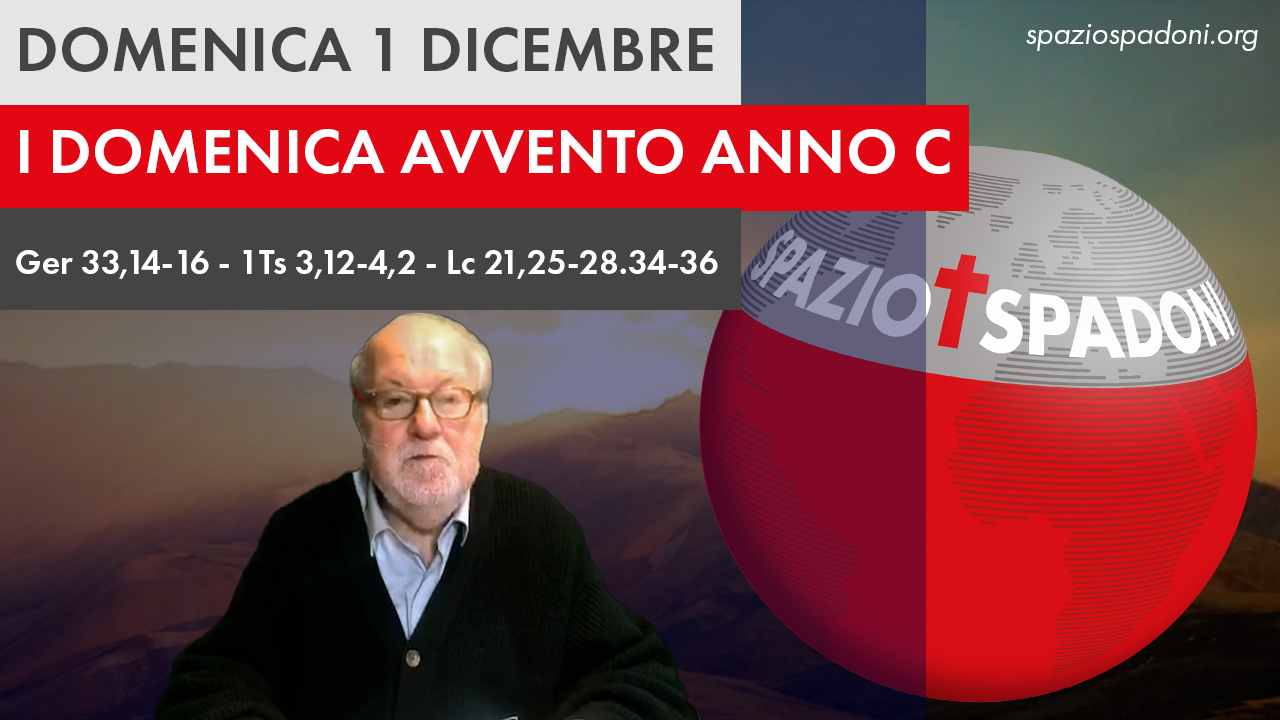
Sunday I Advent Year C
Ger 33,14-16; 1 Ts 3,12-4,2; Lc 21,25-28.34-36
The apocalyptic genre (from apo-kaluptein = s-veil, remove the veil of mystery) is a rethinking of prophetic announcements concerning God’s interventions in history.
Apocalyptic discourse is a great discourse of hope, arising from the conviction that history is walking, under God’s guidance, toward a full and final salvation. The disappointments and continual contradictions of history will never succeed in demolishing this certainty; on the contrary, they will serve to purify it and teach that salvation is, beyond the present existence, the work of God and not man alone.
The apocalyptic discourse calls on believers — who are now Christians caught up in persecution and embittered by the world’s hatred — to renew their confidence in God’s promise and to persevere in their choices of faith and not to compromise: “not even a hair on your head will perish.”
Jesus’ discourse in Luke 21 is a web of facts, revelations, and exhortations.
These events – heresies, wars, persecutions, cosmic phenomena – do not exhaust the panorama of history and its contradictions, but Jesus sees them as typical and recurring situations, situations that the disciple must be ready to face.
When it speaks of the end of the sun, moon, stars and powers of heaven (Gospel: Lk 21:25-26) it alludes to the end of all idolatry, because the stars and celestial forces were considered gods: they will cease to be worshiped and the triumph of the Son of Man will be witnessed,
The word parousia runs throughout New Testament theological thought: it occurs twenty-four times, fourteen of them in the Pauline writings (Second Reading: 1 Thess 13). In the Greek world it designates the arrival of someone, especially the coming of an exceptional person, such as the emperor. An inscription found in Tegea states, “Year 69 from the first parousia of the god Hadrian in Greece.”
In the Jewish world the term acquires a theological meaning. The prophets speak of a particular coming: it is the “day of IHWH” (Am 5:18); but God comes habitually in history, in worship, in the revelation of his word. It is still the prophets who announce the future presence of David’s descendant, the Messiah, such as Jeremiah in the First Reading (Jer 33:14-16). “Adopted by apocalypticism, the theme takes more precise contours and is then spoken of the coming of “one, like a son of man” (Dan 7:13). It is a decisive coming, as later Judaism also points out, which makes it a recurring theme: it is the final coming of God or his Messiah at the conclusion of history. No longer therefore a coming, but the coming” (M. Orsatti).
But the Gospels, Paul and Revelation tell us of a first coming culminating in the death and Resurrection of Jesus, in which the world was judged, Satan destroyed forever and death conquered. It marked the beginning of the Kingdom, and every believer already stands before the throne of God singing its praises. We are already saved, already a prophetic, priestly and royal people. Already we have overcome in Christ and the powers of evil can do nothing against us.
But in the present time we still experience trial, pain, persecution, death, the fall, sin. Therefore, there is also talk of a second coming, when “heaven and earth will disappear” (Rev. 20:11) for each of us.
The Parousia has in God already occurred in the incarnation of the Son, but we still await it because we are still slaves of time. But at our death we will instead be in God forever. We will finally meet him. So death will be the beautiful moment when God will come for us to be with him forever. It is our death, for each of us, the moment of the Lord’s Parousia, and in this sense all the apocalyptic literature that speaks of the Lord’s second coming should be primarily read. It is at the moment of our death that God will meet us definitively.
For the believer, death then will be nothing more than “kissing God.” As the midrash on the death of Moses recounts, “God came down from above to take Moses’ soul, accompanied by his servant angels…God said, ‘Moses, close your eyes,’ and Moses closed them. “Lay your hands on your chest,” and so he did. Then he said, “Draw near your feet,” and Moses drew them near, Then the Holy One, blessed be he, called Moses’ soul, saying to it, “My daughter…, now your end has come. Depart, do not delay!“…And God kissed Moses and took his soul with a kiss of his mouth” (Debarin Rabbh, 11:8-10).
If our lot is to be such joy and such beauty, so much for being afraid of death! The believer knows that death is only a passage to the blessed life. Blessed then also be old age, which is the time that brings us closer to the finish line, to the coveted goal, to the final encounter with the Lord!
